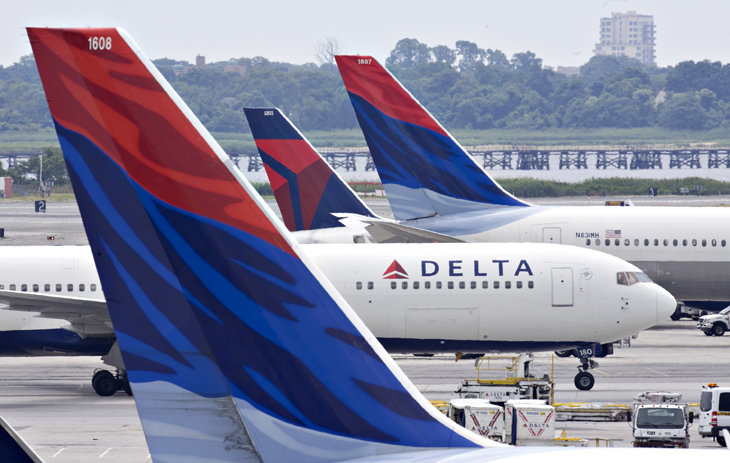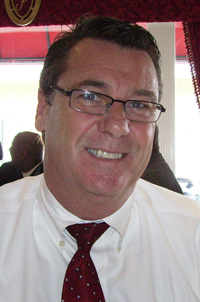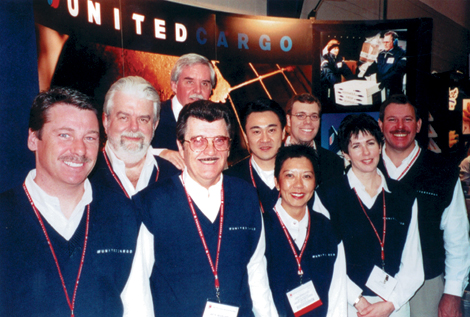Here Comes Say Hey Ray

 The
writer Jimmy Cannon once quoted the great baseball player Willy Mays
as saying: The
writer Jimmy Cannon once quoted the great baseball player Willy Mays
as saying:
“You see a guy you want to
talk to, you say, 'Hey, man. Say hey, man.’”
From that point forward, the greatest
player of his era was known as “The Say Hey Kid.”
Likewise, Delta Air Cargo’s
Director of Sales, Ray Curtis, whom we first met at the Boston Seafood
Show, first addressed us:
“Say Hey, would you take a
picture of me and my team (at the time Ray was the JFK sales boss
for United) for the Air Cargo News?”
Since that time, when we also had
maybe the best all day meal on the hoof, grazing around the Hynes Arena,
every time we meet, somewhere in my mind comes the thought:
“There goes Say Hey Ray.”
Today as before, Say Hey Ray Curtis
comes across as a most engaging interlocutor and time flies fast in
his company. It’s easy to see how one can be lulled into a comfortable,
easy-going web of seduction, but make no mistake – behind those
glasses sparkles a pair of twinkling, alert, intelligent, sharp blue
eyes – always ready to dazzle with quick wit and a smile.
Ray loves what he does, that much
is clear. He thinks he has a dream job; guidance from Neel Shah, Sr.
VP and Chief Cargo Officer, but also a free hand to run Delta Cargo
sales the way he thinks best to bring good results for the company.
The foundation of this success is having a well-defined vision and credibility
and connectivity with the customers based on developed relationships
and ongoing dialogue, and the strategy to deliver. It sounds beguilingly
simple and straightforward – and it seems to work.
One specific example is Delta Cargo
generating 15 percent more revenue from Japan in 2010—without
freighters or a significant movement in fuel—than before with
freighters and passenger aircraft.
Unlike other top cargo executives,
Ray didn’t come from the “passenger side” or technical
operations; he started his cargo career at JFK with Capitol Airlines,
a charter airline founded by army pilots. This was followed by 10 years
of service with Northwest Airlines, where he became regional sales manager
northeast and subsequently spent 13 years at United’s cargo division.
United turned out to be a turning point in more than one way, the indelible
mark of UA aircraft smashing into the World Trade Center on September
11 and in a field in Pennsylvania being one of them.
He was director of strategic accounts
North America when someone named Neel Shah joined the organization.
The rest, as they say, is history and this move marked the beginning
of a beautiful friendship and business partnership. Neel says he has
the best sales team in cargo, period.
We all need our tools. Ray says
specialized sales management courses taken at the Kellogg School of
Management, a world class business school, have been invaluable in shaping
his approach and techniques. He laughs when he talks about the period
immediately prior to accepting his present job; Delta cargo wasn’t
what his friends and colleagues thought would be a smart career move,
given where things stood a mere three years ago.
FT: So
what was the magic?
RC: I
looked at what we had and concluded we needed to change the entire business
model. While the top 15 accounts contribute 80 percent of the revenue,
we treated everyone the same, regardless of the value generated –
whether a counter-to-counter Dash [flight specific small express package
service] or a shipment coming from a major forwarder.
[Here Ray grabs my notepad and pen and draws the respective inverse
pyramids, circles and arrows to illustrate his point]
The first steps were appropriate customer segmentation and customer
specific strategy.
FT: What
are you saying to customers when you go for their business?
RC: What
do you need Delta Cargo to do? I need to be the voice of the customer
- I have to earn their trust. This also means balancing it with my responsibilities
to manage the sales force, 100 in-house and another 100 GSA [general
sales agents].
FT: What
is the biggest misunderstanding that people have about Delta Cargo?
RC: The
degree of transformation that has occurred here and will continue to
occur. In order to obtain and effectively manage freight from top accounts
we had and have to implement and deliver. Take technology—we didn’t
have it and it has since been deployed—scanning in the warehouse
and CCTV [close circuit TV] to monitor high value cargo. This has added
visibility, accountability, reliability and the operational framework
to attract and handle such business.
FT: What
are you doing to develop temperature controlled cargo business?
RC: We
have a growing pharma business; when I came to Atlanta, there were no
coolers. There are now four and we will be adding two more.
FT: What
is your view on alliances?
RC: Well,
the Joint Venture was an interesting concept, but it no longer suited
the time and our strategy. In the U.S., the customer still had to deliver
cargo to the various airline warehouses. We have made good progress
and have some shared warehouses. Sky Team Cargo works better than ever,
but I think cargo alliances are in their infancy. Capital is certainly
one critical issue.
FT: What
are you doing when you deal with shippers and forwarders?
RC: We
have “cohesion agreements” with certain customers, which
are based on SLA [service level agreement] type shipper/forwarder/airline
respective responsibilities.
We have new markets in the Middle East and Eastern Europe where we have
to build on relationships despite no prior connections.
FT: What
is the most important thing to Ray Curtis and Delta cargo right now
going forward in 2011?
RC: Stabilizing
what we have and developing it further.
FT: You
have been in cargo 30 years; who is the most unforgettable character
you met and why?
RC: Peter
Rose of Expeditors, because of his vision and approach to business and
how focused he is on execution. He has been successful in taking the
Expeditors branding and consistency to the entire organization, whether
you are in one of their offices in Asia or in the U.S. Another person
is Bob Kmiotek, VP Route Management Transatlantic at DHL Global Forwarding,
from whom I learned not to forget the people you work with; cargo in
the end is a people business.
FT: How
many days a year do you travel?
RC: 50-60
percent of the time.
FT: When
relaxing, what are your hobbies?
RC: I
have been a ski instructor for many years and still get up to Albany,
NY on weekends. Skiing and snowboarding in the winter and surfing in
the summer; growing up in New York I used to ride the bus with my surfboard
to the beach. My college age daughter is also a ski instructor.
FT: Would
you recommend an air cargo career to your children?
RC: [probably
the longest pause before answering] I have enjoyed a successful career
in corporate America. I have encouraged my children to pursue professions
that will position them to also follow a career in which they can be
independent. My daughter for example is studying to become a speech
therapist, something that can be practiced in a corporate environment
as well as in private practice.
Ted Braun
 Say
Hey Ray, always a team player, is pictured here inside the Hynes
Boston Arena, site of the New England Seafood Show. We recall
a March many moons ago when we snapped this photo with Say hey
and his team at United. Time marches on. Say
Hey is situated at Delta and the Boston Seafood Show swims on. Say
Hey Ray, always a team player, is pictured here inside the Hynes
Boston Arena, site of the New England Seafood Show. We recall
a March many moons ago when we snapped this photo with Say hey
and his team at United. Time marches on. Say
Hey is situated at Delta and the Boston Seafood Show swims on.
|
A Walk Around Delta Cargo
As this was ‘Delta Cargo Day,’
I had an opportunity to pop in and say hello to Neel Shah who is sitting
in his office with Greg Mays, Managing Director – Global Cargo
Operations. Neel Shah manages a staff of 1,770 worldwide and reports
directly to Ed Bastian, Delta’s president. This was a major change
in attitude at the top management levels for cargo; Neel has a seat
at the table with direct influence on major decisions when it comes
to the fleet and working to achieve total route profitability.
Utilizing its resources—as Neel
puts it—people, technology and operations is the fine line he
walks with his team to broker goals among various company divisions.
A good example was Valentine’s Day, when the scheduled B757 aircraft
to Bogota, Colombia was replaced with a B767 to accommodate the extra
loads of flowers, a testament to the fact that cargo’s interests
and needs are as vital as those of the passenger business.
The objective is strategic growth and
when asked about freighters, the answer is that he is not closed to
that possibility; however, profitability and demand are what need to
be attained and managed carefully. Delta Cargo pays its share of flight
and incremental expenses in addition to its administrative overhead
and operating expenses, including fuel, but does not pay for the belly
space per se.
Another cargo driven decision is the selection
of doors on the rear hold of the B777, at additional cost, instead of
the standard configuration which is limited to bulk loading cargo and
mail.
When asked what the next ‘big thing’
for Delta cargo will be, Neel responds that it is simply becoming a
better company overall. Since 2008, Delta Cargo has insourced cargo
handling and managed a massive training program of the new resources.
In between it also had to manage and digest the merger with Northwest
– never a dull moment for these overachievers!
Out at North Cargo I meet John Campbell,
manager cargo services responsible for domestic operations and trucking.
There is a staff of 450 people working in three shifts around the clock
at the Atlanta Worldport handling between 1.5 and 2 million pounds of
freight a day. The international and domestic warehouses are side by
side bonded areas with ‘active haul out’ lanes marked by
destination and color coded with red stripes for international and green
stripes for domestic. The international warehouse is divided into import
and export, which subsequently flows into domestics whether in or outbound,
as the case may be. Freight is prepared in containers or on pallets
and weighed, labeled and set on dollies ready to be pulled to the flight
line.
Space control is flight based with constant
matching of on-hand shipments versus space available on a flight, all
closely managed with a dizzying array of mobile devices, handheld scanners
and computer terminals. An entire ULD can be built using a handheld
scanner.
There is a designated trucking section
with multiple docks for the extensive and John, and his counterparts
also manage the ULD stock and its utilization.
Having insourced the handling after training
a significant number of personnel, it is easy to spot grey heads—Delta
staff with 20-25 and more years of service and minimal turnover. What
made Delta a special airline was the family atmosphere that prevailed
and it is also what makes managers like John, who came from the Cincinnati
hub with a wealth of experience, effective. Everything is done in a
businesslike manner that belies the pressures and challenges airline
operations face every day.
So becoming better overall is a clear
objective and this cargo unit is very focused on delivering for its
customers.
Ted Braun/Geoffrey |